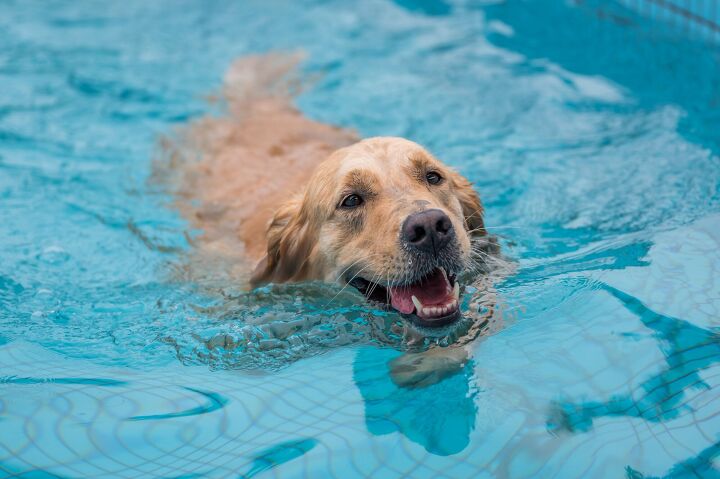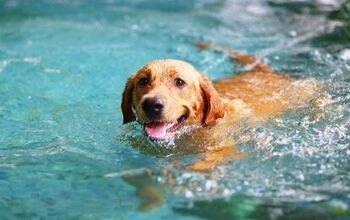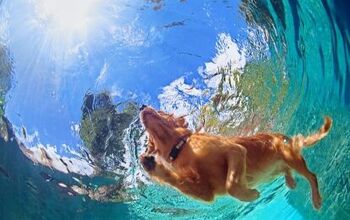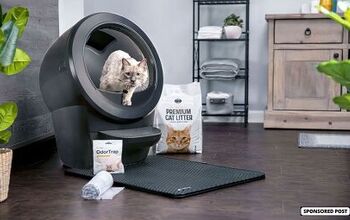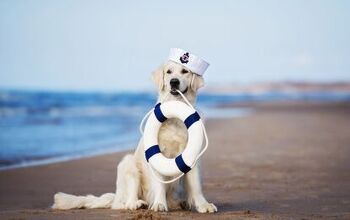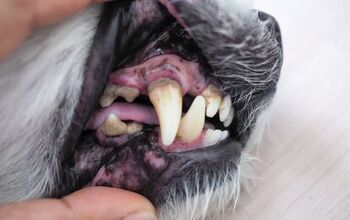When the days get hot, your dog may want to jump in the pool to cool off. But should you go with chlorine or saltwater in your pool – which option is better for your dog?
As the excruciatingly hot summer drew to a close in the city of Toronto, municipal officials decided to open 10 of the city’s public pools to pooches. It was for one day only and was offered up just prior to the Public Works department shutting the pools down for the season.
As with humans, rules applied: just two dogs per owner, all had to be accompanied by an 18-year old+ individual, manners were required and absolutely no cannon-balls (okay, I added that last one). So, for the entire day, hot and restless dogs could enjoy a little respite from one of the hottest summers on record and pet owners could indulge in a little one-on-fun time with their fur-kid.
Now, I don’t have a pool myself, but I do know many folks who do and quite frankly when pool party season hits, dogs are invariably on the unvite list (nod to Seinfeld). It’s not about the wet mess or smell of a dank dog, nor is it about the possible transmission of doggie germs to unsuspecting bathers. It’s almost always down to the fear of him shredding the pool liner to bits as he scrambles along the outer edge, trying to exit the pool.
So, when the city unexpectedly announced that public pools would be going to the dogs on this sunny Sunday, it was the first time I’d actually wondered if having Rover plunging head-first, eyes open and mouth agape into a sea of chlorine was actually a good thing.
Related: 10 Dog Breeds That Can’t Swim
Anyone who has spent an afternoon in a chlorinated pool understands the effect this chemical can have when it connects with your eyes – that short-term burning or stinging sensation that has you squinting and reaching for the nearest towel. And who can forget that strong smell of chlorine we wear around on our skin and in our hair until we have had a chance to take a good long shower? Is it any wonder that bathing suit manufacturers will typically recommend that to preserve the life of the suit, that it be rinsed in fresh-water after each use?
I mean, there is no question that this chemical is powerful. In fact, in order to oxidize microorganisms and prevent a build-up of bacteria and algae in your pool, chlorine actually breaks itself down to become a hypochlorous acid. Yikes, right?
Not so fast. Before you, yourself swear off pool parties for life, know that the chlorine levels in well-maintained pools are safe for humans – even if you ingest some while splashing around. It may not be pleasant, but you’ll be fine. And so, will your dog.
Related: Top 10 Best Water Breed Dogs
Short-term swims for our four-legged pooches are perfectly fine. The caveat is that just like humans, dogs need to be rinsed with fresh, clean water after each swim. Don’t decide that because he’s likely to be taking the plunge later on in the day, that its okay to leave him wet and sitting with chlorine all over his fur. Shower him down and if he’s done for the day, dry him off. Fully. Use a towel on the ears and any skin folds. And for double-coated breeds, always ensure his lower back and hindquarters are fully dry. Hot spots thrive on damp, moist skin and you’re setting him up for an uncomfortable, smelly affliction if you get lazy and decide to let him “air dry”.
Additionally, chlorine can pose a skin irritant with some dogs. If you notice him starting to scratch or develop skin issues such as red spots or rashes, plan to replace his cool-down time in a chlorinated inground pool to something like a kid’s wading pool that you can fill with plain hose water during those summer heatwaves.
And because the eyes and ears of a dog can be much more sensitive to chemicals than his owners, be on alert for signs of irritation and always dry ears (inside and out) to prevent infection.
Now, if you yourself happen to be the lucky pool owner, you may want to heed some advice from Dr. Jerry Klein, Chief Veterinary Officer of the American Kennel Club (AKC) who suggests that dog owners may want to consider using non-chlorine chemicals in their pool such as bromine – which is much safer for pets. Although more expensive than chlorine, it has a milder odor, is not as corrosive and presents less of the bleaching side effects of chlorine. It’s also reported to be less irritating to human eyes and skin which will mean the same benefit for your pet.
Related: How Water is Important for your Dog’s Digestive Health
Of course, where you see a refreshing pool for swimming, your pooch is eyeballing the biggest water dish he’s ever witnessed. While a small amount of natural consumption (akin to what happens when he’s swimming around or diving in) will invariably happen, he should be discouraged from actually drinking from the pool. Although properly treated pool water contains very low levels of chlorine – far from toxic – it’s important to keep his bowl of clean, fresh water close at hand and encourage him to drink from that source. In some instances, too much consumption of chlorinated water can result in minor gastro-intestinal issues in smaller, older or GI-prone dogs.
It’s particularly important to monitor his consumption if your pooch tends to not only drink from the pool as his primary source of water but also likes to gulp mouthfuls as he paddles around.
But while chlorinated pools are considered safe, the actual concentrate form of chlorine that is added to the pool can be deadly to pets and children. Concentrated chlorine tablets need to be stored in the original container and kept in a place that is inaccessible to curious pets and kids.
Now, if you’re one of the growing numbers that have opted for a saltwater pool over-chlorinated, you may be wondering if it provides a safer swim space for your pooch. As the name suggests, saltwater pools use salt to cleanse and sanitize the water rather than chlorine. And while the salt water found in oceans can make your pooch extremely ill if he drinks too much, the level of salt that is found in a pool sanitation system (approximately 10% of that found in ocean water) is considered safe for your dog to paddle around in.
That said, be aware that an increase in salt intake can make your little guy extra thirsty and cause him to drink more water. And because what goes in must come out, you may find him more prone to accidents around the house. Just sayin’. Further, dogs who are on a low-sodium diet for issues that include heart or kidney disease should not be allowed to drink from saltwater pools. Or, in my humble opinion, be allowed to even swim in them.
And just like chlorinated water you need to give your pooch a good rinse after his swim, ensure he is fully dried (either towel or blow-dryer) and that the inside of his ears – particularly with floppy-eared dogs – is completely dry.
Related: Top 10 Life Jackets for Dogs
Pool-time is fun-time for the entire family but never lose sight of where your dog is. Just like humans, he can get tired while swimming and panic if he can’t find a way out of the pool. Remember, the sides are steep and ladders are not something that a dog instinctively knows how to climb. Monitor your pooch the same way you would a young child. And if swimming isn’t his strong suit, check out some of the life jackets available for dogs of all sizes. Particularly if you plan to take him out on a boat.
AKC’s Dr. Klein shares a few more tips on how to introduce your pooch to any water situation:
Start him early and take the time to get him comfortable by letting him play in 1-2 inches of water in the bathtub or a children’s pool.If you’re at a lake or on open water, keep him in the shallows initially and praise him once he starts to wade around. Is this something he enjoys or is he anxious?Once you know he is comfortable, guide him in with your arms resting under his belly so he feels secure, he knows you’re there, but his legs are unhindered so he can start to paddle.Remember that not all dogs love water (mine, sure don’t) so never push the issue or think he’ll come around to the idea if you just throw him in. Always respect the landlubber in your dog.





